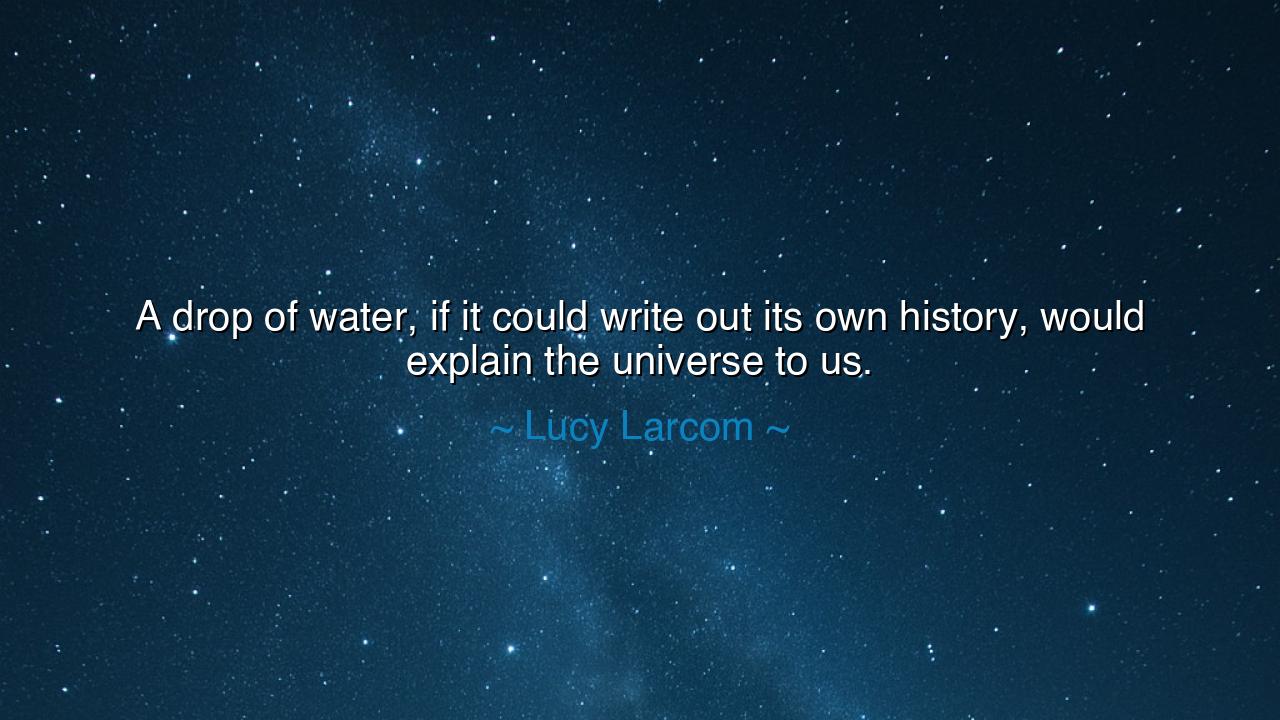
A drop of water, if it could write out its own history, would
A drop of water, if it could write out its own history, would explain the universe to us.






In the quiet depths of contemplation, Lucy Larcom, the poet and moral thinker of 19th-century New England, once wrote: “A drop of water, if it could write out its own history, would explain the universe to us.” To the hurried reader, these words may seem a simple tribute to nature’s wonder—but to the seeker of wisdom, they unveil an eternal mystery: that in the smallest of things lies the story of the infinite. In this single line, Larcom reminds us that the universe is not hidden in distant stars or vast oceans, but reflected in the smallest spark of creation, if only we would pause long enough to see it.
To understand the origin of these words, one must remember who Lucy Larcom was. Born in 1824 in Massachusetts, she labored as a young girl in the Lowell textile mills, where she spun cotton by day and wrote poetry by night. Surrounded by the hum of machinery and the rhythm of human effort, she learned to find beauty in the ordinary, divinity in the details. For her, every object—whether a thread, a flower, or a drop of water—was a gateway to understanding the deeper unity of life. The girl who once carried buckets from the mill’s river became the poet who saw the universe mirrored in a single droplet. Her quote arises from this vision: that even the most humble element of nature carries within it the whole story of existence.
In her metaphor of the drop of water, Larcom teaches that creation is woven together in invisible harmony. A single drop holds within it the memory of the clouds and the sea, the rivers and the rain. It has traveled through time and transformation, rising as mist, falling as storm, shaping mountains and nurturing seeds. Were it able to speak, it would tell of the birth of oceans, the slow erosion of stone, the cycles of death and renewal that sustain the earth. And in that telling, it would also whisper of us—for we, too, are made of water, bound to the same eternal rhythm. To know the history of the drop would be to know the law of unity that holds all creation in balance—the same law that guides the galaxies and beats within the human heart.
The ancients would have understood her meaning well. When Thales of Miletus, one of the earliest philosophers, declared that “all is water,” he spoke not in ignorance but in awe. He saw in water the origin of life, the symbol of continuity and change, the element that connects all things. From the sacred rivers of India to the baptismal fonts of Christendom, water has always been a sign of purification, creation, and rebirth. Larcom’s poetic wisdom is a continuation of this ancient reverence. She reminds us that to understand the small is to glimpse the vast, and that no fragment of nature is too humble to reflect the divine order of the cosmos.
There is a story told of Isaac Newton, who, while observing a falling apple, began to ponder the invisible force that drew it downward. In that moment of humble observation, he discovered the law of gravitation—the very principle that binds the earth to the sun and governs the motion of the stars. So too with Larcom’s drop of water: it is through attention to the simple and the overlooked that we uncover the profound. The universe, she tells us, hides not in complexity but in clarity, not in distance but in presence. Every drop of rain, every grain of sand, every breath of wind carries the same truth, waiting for the mind that will listen.
But her words carry also a moral weight. The drop of water reminds us of our interconnectedness—that nothing in existence stands alone. The rivers that sustain life in one land may rise from storms in another; the choices we make ripple outward, touching shores we may never see. Just as the drop is part of the ocean, so are we part of the great web of being. To live with awareness of this truth is to live with reverence—with humility toward nature, compassion toward others, and gratitude for the quiet miracles that sustain us.
So, my child of thought, take this lesson to heart: learn to see the universe in the smallest of things. When you drink from a glass of water, remember that it has journeyed through centuries to reach your hand. When you stand in the rain, know that you are being touched by the same substance that once nourished the first forests and cooled the stars. Seek wisdom not only in books and theories, but in the living world around you—the leaf, the stone, the stream. For as Lucy Larcom teaches, every drop, every moment, every life holds the story of the cosmos. And if we learn to listen deeply, even the simplest whisper of nature will explain the mystery of the universe to us.






AAdministratorAdministrator
Welcome, honored guests. Please leave a comment, we will respond soon